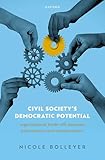Civil society's democratic potential : organizational trade offs between participation and representation / Nicole Bolleyer.
Publisher: New York : Oxford University Press, 2024Description: pages cmContent type:- text
- unmediated
- volume
- 9780198884392
| Item type | Current library | Status | Barcode | |
|---|---|---|---|---|
 Open Access Books - Publishers
Open Access Books - Publishers
|
National Law School | Available | OABP429 |
"Which civil society organizations (CSOs) contribute to democracy, how and why? Organized civil society including interest groups, political parties and service-oriented associations is traditionally considered a cornerstone of democracy. Their potential to contribute to democracy is more often than not treated as a given. Nevertheless, individual CSOs' readiness and ability to serve as venues for participation, vehicles of democratic representation or indeed both at the same time have remained a matter of on-going debate across different social science disciplines. Prominent notions such as 'NGOization' and 'cartelization' have problematized CSOs' and parties' increasing state dependency, professionalization and bureaucratization, shifting organizational priorities away from societal values towards instrumentally driven self-maintenance, supposedly diminishing their contribution to democratic governance. This study argues that two contrasting governance templates - the 'voluntary association' and the 'professionalized voluntary organization' - allow theorizing fundamental trade-offs shaping CSOs' ability to simultaneously 'perform' on three dimensions central to their democratic contributions: participation, representation and societal responsiveness. The study's theoretical framework is examined across four European democracies (Germany, Norway, Switzerland, UK) by combining the analysis of survey data with qualitative case studies of individual organizations' evolution over several decades"-- Provided by publisher.
There are no comments on this title.
